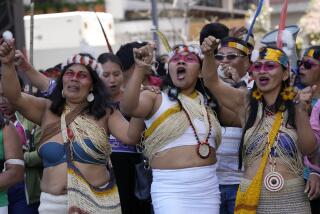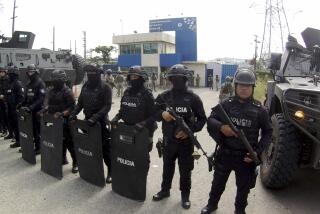Impact of Earthquakes Still Shakes National Economy of Ecuador
- Share via
QUITO, Ecuador — Fernando Flores, headwaiter at the Hereford Grill, one of Quito’s most popular steak houses, looked glumly around a dining room empty of customers on a Saturday night.
“This is a disaster,” he said.
Flores’ personal calamity is the result of a ban on weekend gasoline sales ordered by President Leon Febres Cordero to meet what he called “the worst disaster in the history of Ecuador.”
Ten strong earthquakes in northern Ecuador on March 5-6 left an estimated 1,000 people dead or missing, crippled the country’s vital oil industry and forced the government to suspend payments for the rest of the year on Ecuador’s $8.2-billion foreign debt.
For the nation’s 9 million people, times are likely to get even harder than they have been for the last year.
Oil Exports Halted
“It was as if someone took the blood from a human being and asked him to live,” Febres Cordero said in describing the economic impact of the rupture of Ecuador’s trans-Andean oil pipeline and the resulting halt in exports.
In recent years oil has provided more than 60% of the dollar earnings of this small South American nation, which began exporting petroleum in 1972.
“The country is living through a difficult period in its history. The problems are mounting up,” the Quito newspaper El Comercio said, noting that the quake-spawned damage to the economy is the latest in a series of economic and political crises that have shaken Ecuador in the last 12 months.
The crises include two failed military rebellions in March, 1986, by a mutinous air force commander and the kidnaping of the president in January by air force commandos loyal to the rebel general.
Bitter Ideological Feud
Febres Cordero, a rough-spoken champion of free enterprise, and his leftist and center-left opponents who control Congress have also conducted a bitter ideological feud that climaxed in an unsuccessful attempt in January to impeach him and raised the specter of a military coup.
The political climate worsened when students held violent street demonstrations to protest the government’s post-quake austerity measures, and the country’s largest labor federation, which is controlled by Communists, announced plans for a 24-hour general strike Wednesday to protest Febres Cordero’s emergency measures. The federation, the United Front of Laborers, also called for the president’s impeachment.
“The working class is not willing to allow the country’s catastrophic situation to be utilized to impose new economic measures against the interests of the people,” said Fausto Dutan, the union’s leader.
In addition to banning gasoline sales on weekends and rationing gasoline during the work week, the government raised the price of gasoline from the equivalent of 33 cents to 60 cents a gallon and increased bus fares from 8 sucres to 10 sucres (7 cents).
Unpopular Measures
The increases are intended to shave domestic consumption of petroleum by 25% and boost government revenues. But they are unpopular measures in a country where the minimum wage is $80 a month.
Febres Cordero’s political opponents, including Communists and center-left politicians, charge that the increase in gasoline prices will spur inflation, now running at 25%.
“The increase in the price of fuel will have a chain reaction on the prices of all essential goods and services,” said Rodrigo Borja, a Social Democrat who is vying for his party’s nomination in next year’s presidential election.
The government rejected demands from organized labor that the minimum wage be increased to $167 a month to compensate for the price increases and said that, as part of its own belt-tightening, salaries of top public officials, including the president, were being slashed by 20%.
Cooperation Urged
Newspaper editorials urged the government and the opposition to cooperate in this time of crisis. But Febres Cordero’s foes accused him of sabotaging the political truce he offered shortly after the earthquakes.
Borja said he had distrusted the truce offer from the beginning. He accused Febres Cordero of using the crisis “to try to win the silence of the opposition on these measures, which are a blow to the working class and the poor.”
The government said it had no alternative but to impose the austerity steps.
Officials estimate the quake damage at nearly $1 billion, including lost oil revenues, repair of a 30-mile section of the pipeline and reconstruction of bridges and roads destroyed by mud slides and flash flooding in the quake-ravaged jungles where the oil industry is centered.
Ecuador already was reeling from a financial crisis provoked by the sharp drop in world oil prices last year.
Oil income fell from $1.8 billion in 1985 to $970 million in 1986 while total exports dropped from $3 billion to $2.2 billion.
Emergency Aid Sought
The government is seeking emergency economic aid because of the earthquakes, and emissaries from the World Bank, the Inter-American Development Bank and other international lending agencies met in Quito to come up with an aid package.
Officials say that repair of the key pipeline will take five months and those costs alone will reach $150 million.
Nearby Venezuela, a fellow member of the Organization of Petroleum Exporting Countries, is lending Ecuador 5 million barrels of oil for domestic consumption--enough for 50 days at current levels of usage. It also is providing 50,000 barrels a day to help cover Ecuador’s export commitments of 144,000 barrels daily.
The aid helps but is not enough to keep Ecuadoreans from bracing for difficult days ahead.
Patricio Andrade, waiting in line at a gasoline station with two dozen other drivers to buy his quota of 10 gallons, voiced a view expressed by many Ecuadoreans since the earthquakes.
“If we do not stick together in this hour of crisis and cooperate,” he said, “there is no hope for Ecuador.”
More to Read
Sign up for Essential California
The most important California stories and recommendations in your inbox every morning.
You may occasionally receive promotional content from the Los Angeles Times.










